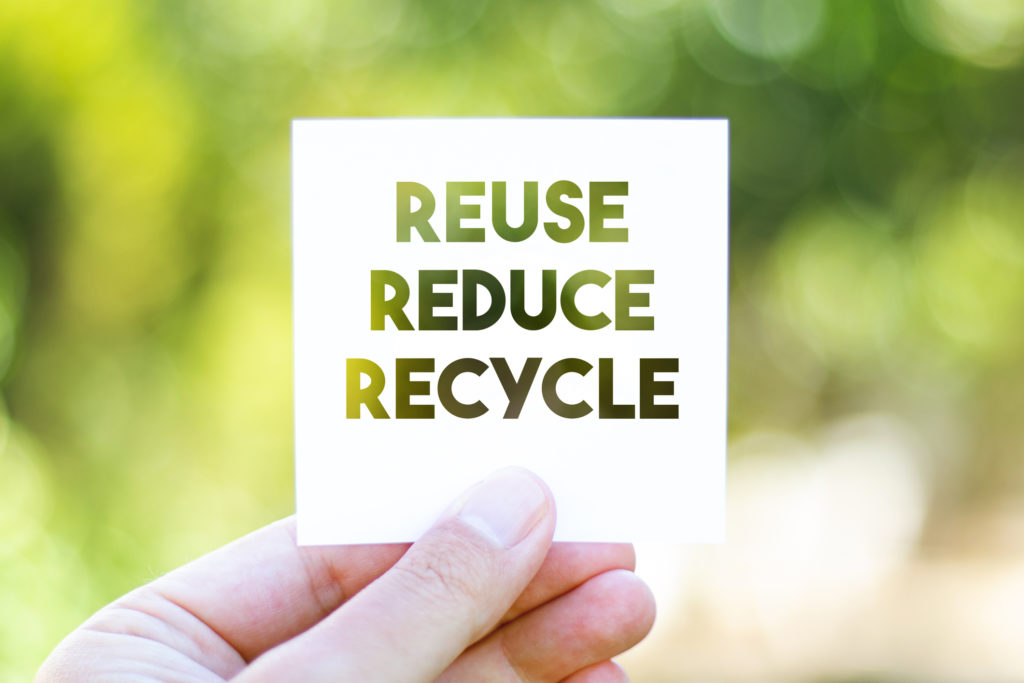At one time, sustainability – which UCLA describes as the balance between the environment, equity, and the economy – was almost treated as a trend. However, because so many changes in the environment seem out of control, sustainability has become significantly more important. It allows us to provide resources today without compromising those resources for future generations.
In addition to preserving and protecting our planet, sustainability offers many benefits for your business. It can reduce costs, attract and retain employees, improve your business’ reputation, and increase customer loyalty.
- 81% of global consumers feel strongly that companies should help improve the environment (Nielsen)
- 79% of consumers are changing their purchase preferences based on factors like environmental impact (Capgemini Research Institute)
- 77% of retail businesses indicate that sustainability has led to increases in customer loyalty (Capgemini)
- 66% of consumers would spend more for a product if it came from a sustainable brand (Nielsen)
- 63% of retail businesses reported a reduction in costs and increase in revenue after instituting a sustainability strategy (Capgemini and McKinsey Sustainability)
- 90% of Millennials, 84% of Gen X, and 77% of Baby Boomers say working for sustainable companies is a top priority (Lightspeed)
The great news is that it’s relatively easy for small businesses to make a big impact. Here are 5 ways you can start to become more sustainable.
Save energy (and money)
This is a relatively easy place to start, though it’s an area that does allow you to get quite ambitious with changes.
- Use natural light whenever possible
- Change to LED bulbs, which use 75% less energy and last up to 25 times longer
- Set your thermostat at 78 degrees during the summer and 68 degrees during the winter (per the EPA)
- Use energy efficient appliances
- Turn off equipment off at night and unplug unused devices
- Choose a green web hosting provider to reduce energy consumption and CO2 emissions
- Switch to solar to reduce your energy costs by 75% (tax credits and low interest loans can help with installation)

Reduce waste
Reduce. Reuse. Recycle. This should be the mantra of every person and small business. Though the United States represents only 4% of the global population, we’re responsible for 12% of the trash. According to the Environmental Protection Agency (EPA), we dispose of more than 292 million tons of solid waste each year. That translates to 1,800 pounds per person. And so, reducing waste at your small business is yet another great place to start with sustainability.
Some simple suggestions:
- Get a coffee maker (not one using single use pods) and encourage team members to use their own mugs (not paper cups)
- Use real plates and utensils for meals in the office rather than disposable options
- Reduce using direct mail as a marketing strategy
- Use both sides of paper when using the printer
- Transition from a business based on paper to one using the cloud (billing, receipts, etc.)
On this last point, cloud-based solutions not only reduce waste, but create a more efficient and collaborative process for your employees. It’s also an inevitable and necessary shift when you’re including remote team members and embracing hybrid work (more on that later).
Once you’ve reduced your waste and are reusing items as much as possible, it’s time to embrace recycling. Most cities are pretty proactive about providing bins and receptacles for various types of waste, especially for businesses. So just incorporate those into your process and make zero waste your business goal.

Go green with packaging
According to the EPA, containers and packaging account for over 28% of what reaches U.S. landfills each year. Packaging also happens to make up most of what our litters our beaches and other bodies of water.
Use:
- Biodegradable packaging and filler
- Recycled cardboard
- Compostable bags
Avoid:
- Plastic
- Styrofoam
Because we live in a world of almost constant deliveries – both sending and receiving – here are some best practices to consider:
- Use as little packaging as possible for your product
- When shipping, use packaging that is just big enough to hold the product inside
- Offer discounts on shipping to encourage customers to consolidate orders
At Meraki Go, we’re particularly proud that our new box – with its end opening – allowed us to reduce 27% of the material used to produce it. In addition, our packaging is composed of 70% recycled corrugated material. Further, because no plastic is used, our packaging is 100% recyclable.
Offer remote work
81% of global consumers feel strongly that companies should help improve the environment
SOURCE: Nielsen
Not only are commutes costly from the perspective of productivity, they take a tremendous toll on our environment. Whenever you’re able to offer the ability for your employees to work remotely, it cuts down on gasoline, pollution, and reduces your company’s carbon footprint. An additional benefit is that it also saves energy (and money) on utilities such as lighting and heating. Meraki Go’s Router Firewall Plus offers client VPN, which means your team – whether freelance or full-time – can access your business network from anywhere.
Of course your employees may still need to commute, so encourage the use of mass transportation. Buses, trains, and vanpools are the greenest ways to commute, especially when many of these now use clean energy. You can offer public transportation benefits to your employees, either directly or through a defined program with your human resources (HR) department.
Get philanthropic
There are many organizations doing incredible work to protect the environment. So get everyone at your business – from employees to customers – excited about supporting various green initiatives that help offset your ecological impact.
- Donate a percentage of your profits each year to environmental programs
- Launch a fundraiser to promote environmental programs that are aligned with your business’ values
Climate change is one of our biggest challenges, for example, and Vox has shared a list of some of the best non-profit organizations you can support who are trying to address this global emergency.
***
Hopefully this helps illustrate the reasons small businesses should take sustainability seriously and how it can – and should – be included as part of your overall strategy.

SOURCES:
Business Insider
Business News Daily
Capgemini Research Institute
Cisco
CNET
Earth.org
Environmental Protection Agency
Forbes
Green Biz
Green Geeks
Lightspeed
Looka
McKinsey Sustainability
Nielsen
Survey Monkey
Sustainable Brands
Tech Radar
UCLA Sustainability
U.S. Chamber of Commerce
U.S. Department of Energy
U.S. Office of Energy Efficiency and Renewable Energy





